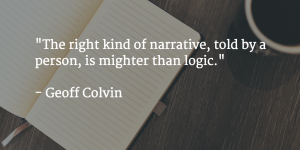1-Sentence-Summary: Humans Are Underrated dissects how computers now beat humans when it comes to knowledge, but will never surpass us in social skills or creativity.
Read in: 3 minutes
Favorite quote from the author:

Audio Summary
Listen to the audio of this summary with a free reading.fm account*:
To begin, Geoff Colvin‘s Humans Are Underrated introduces Moore’s Law, which states that computational power will double every two years. This is owed to the fact that the advancements in production technology allow twice the amount of transistors per chip in roughly the same time frame.
Since physical space is limited, Moore’s Law must eventually come to an end, but we are still far from it. Until now it has led to computers exceeding in many tasks we believed to be uniquely human.
For example, psychologist Paul Ekman decoded over 3,000 micro-expressions, which we can create using the 40 muscles of our face. He fed all the data of his Facial Action Coding System to a computer and pitted it against a human in recognizing emotions based on facial expressions.
The result: while the computer guessed emotions correctly 85% of the time, humans only scored right in 55% of all cases.
While these advancements are great for progress, computers also come with drawbacks. Spending hours on end in front of screens significantly decreases our social skills, like understanding body language or reading other’s emotions. Luckily this can be reversed, as a study with sixth-graders at a screen free camp showed.
Similarly, social media might help us maintain more relationships, but studies have found that the quality of relationships often suffers, because we tend to trust less overall and don’t bond as effectively as in person or over the phone.
Ironically, we need to improve exactly these kinds of skills, in order to be successful today. With knowledge being available 24/7 at arm’s reach, social skills are what sets us apart from computers.
For example, while a computer can instantly analyze millions of legal cases, provide all the required literature and predict the outcome of the case better than we do, it can never connect with the defendant and persuade her to act in her own best interest.
Thanks to modern technology we can now connect cheaply with anyone, anywhere. This also makes it much easier to offend people from other cultures, just because we might not know about their culture.
His social skills and knowledge of culture saved Lieutenant Colonel Chris Hughes and his team during the Iraq War. When ambushed by Iraqi soldiers, instead of escalating the situation, they knelt down and pointed their guns to the ground– a gesture of respect.
They were able to withdraw unharmed.
Empathy is another crucial skill, which works only when shown genuinely from a human being. It is the ability to understand how others feel.
For example a great doctor will not just listen to where it hurts and treat the symptoms by giving you the right medicine, she will also make an effort to put herself in your shoes and tell you what you can do to feel better about the situation.
Even if a computer could understand your feelings and react in the right way, you’d probably never feel as good about going to a computer doctor as you would when seeing another human being.
Next to social skills it will also be impossible for computers to beat humans in one other thing: creativity.
I just saw the new Star Wars movie and if you’ve ever watched an inspiring movie with a great story, you know that it’s more convincing than the best rational argument.
Storytelling is how Steve Denning was able to convince the World Bank to make important information available to health workers in Zambia, and it’s what Gary Vaynerchuk preaches to anyone who’s trying to make it online.
We want to get to know the person behind the story, learn about their successes and failures, and that’s something a computer just can’t deliver.
That’s why great companies like Apple or Google foster creativity by maximizing the chance of random employee interactions. With great common areas like big staff meeting rooms or an awesome cafeteria, they make sure genius can strike as often as possible, which is likely to be when we talk to others over a simple cup of coffee.
Ideally, we can create a win-win situation by using computers to teach us knowledge-related skills (like repairing a car or statistics) and improve our social skills.
For example, the software SendLove unites all the positive aspects by encouraging employees to thank one another publicly. The messages can be seen by the entire team, inspiring others to help even more.
Humans Are Underrated Review
After reading The End of Jobs yesterday, I found Humans Are Underrated a great addition to the topic of creativity. I was a little surprised by the strong focus on social skills, but maybe, being an introvert, that’s just not what I wanted to hear.
I would have liked to see these blinks expand even more on creativity, but the statistics and studies quoted were very interesting. I really liked the idea of combining computers, social skills and creativity to get the best of both worlds.
Who would I recommend the Humans Are Underrated summary to?
The 50 year old who’s worried about losing his or her job to a computer, the 15 year old computer geek who never goes outside and anyone extroverted.
Last Updated on July 21, 2022